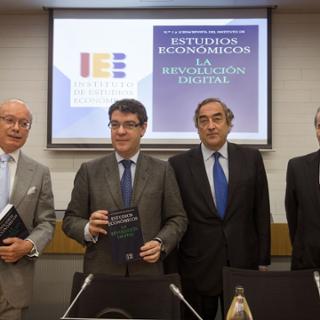The Digital Revolution is radically changing the way in which individuals and companies interact and, with it, the economic reality known so far.
Institute of Economic Studies
128, Castelló Street, 6th Floor
28006 MADRID
The Institute of Economic Studies has presented the number 1 and 2 of 2016 of the Journal of the IEE titled The Digital Revolution. In the act have intervened the Minister of Energy, Tourism and Digital Agenda, Álvaro Nadal; The President of CEOE, Juan Rosell; The President of the Institute of Economic Studies, José Luis Feito; And Vice-Chairman of the Board of Directors of Telefónica and Chairman of the Digital Society Commission of CEOE, Julio Linares.
This double issue of the Journal of the IEE contains the voice of a group of experts from Telefónica, as well as from the world of business, the Academy and Public Administration, along with the contribution of qualified members of the Digital Society Commission Of CEOE who, with their experience and knowledge, help to understand the causes, consequences and risks of digitization. Throughout the articles that compose the volume detail different aspects, but complementary, of the Digital Revolution, the already known as Fourth Industrial Revolution, which arrived at an indeterminate moment but is here to stay. Professor Carlos Juiz, member of the ACSIC research group at the University of the Balearic Islands, is the author of the chapter on Corporate Governance for project selection and prioritization of ICT investments.
From an economic point of view, the digital world now accounts for more than 20% of world GDP, and this percentage will increase. Although commercial and financial flows have declined significantly since 2008, digital flows, data flows and information flows are continuously expanding, and have continued to grow in recent years.
All the agents must bet on modernizing and the Public Administrations must collaborate closely to ensure that the private sector can invest with the maximum possible guarantees. For example, in the banking sector, traditional business models are at risk in developed countries because intermediation margins are falling and profitability is declining in a world of low interest rates. But this is not the main challenge they face, but must adapt to the disruptive change involved in digitization. In the industrial sector it will be essential to adopt the new technologies that are appearing successively and the orientation of the entire value chain towards the needs of the customer. Therefore, the article by Carlos Juiz explains briefly the importance of the selection and prioritization of ICT projects that contribute business value, as well as the responsibility of corporate governance of public and private companies in that priority selection.
Within the many advances that are being made by the Digital Revolution, one of the most important ones that are shaping today's society, and whose potential for growth is of great importance, is the Internet of Things (IoT, for its acronym in English). This Revolution could be defined as a network of networks and platforms that allows unique elements to communicate and interact with the external environment without human or limited intervention. The economic implications of this technology extension are enormous both in terms of added value and potential benefit to final consumers as well as to the different productive sectors. It can impact both the transport and the automotive sector, as well as the energy and utilities sectors, or, finally, safety and emergencies. Or it can help set up smarter cities.
More information at (in Spanish):
http://www.ieemadrid.es/wp-content/uploads/SUMARIO-La-Revolucion-Digital.pdf
http://cincodias.com/cincodias/2016/11/21/economia/1479744621_167494.html
http://eldia.es/2016-11-21/economia/economia18.htm
http://www.ceoe.es/es/contenido/agenda/presentacion-del-libro-la-revolucion-digital
Event date: 21/11/2016
Publication date: Fri Nov 25 16:20:00 CET 2016
